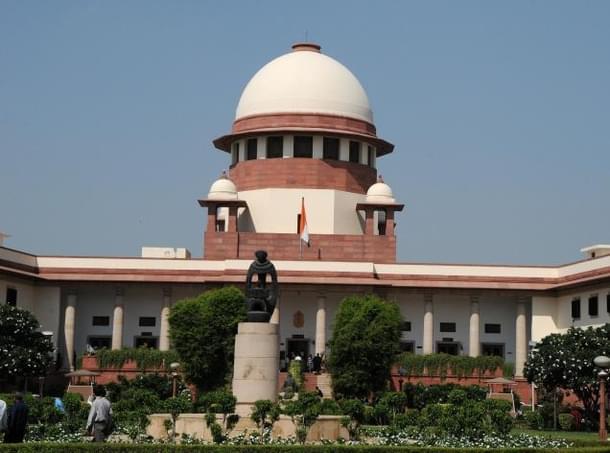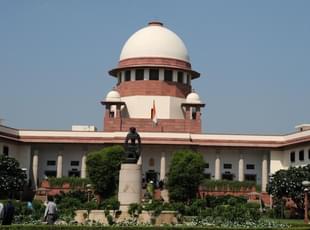Politics
Who’s Who In The Triple Talaq Case That The Supreme Court Is Hearing, Explained
Swarajya Staff
May 12, 2017, 01:17 PM | Updated 01:16 PM IST
Save & read from anywhere!
Bookmark stories for easy access on any device or the Swarajya app.


Landmark proceedings to determine the validity of triple talaq began today at the Supreme Court (SC). A multi-faith bench is set to establish if the ‘instant’ divorce, part of the Muslim personal law, contravenes the spirit of the Constitution of India and violates gender parity and dignity of women, after a seven-day hearing.
The day of reckoning is not far for this practice – the relevance of which will be thrashed out at a six-day hearing, shared equally between those who are challenging it and those who are defending. The court will hear the final arguments on a case pertinently titled, ‘Quest for Equality vs. Jamiat Ulama-i-Hind’ on day seven (Thursday), the first day of the SC's summer vacation.
The latest petition filed in the triple talaq case stands out amid several others filed with the Supreme Court. RSS-affiliated Forum for Awareness of National Security (FANS) has filed the 69th petition and will have none other than distinguished lawyer Ram Jethmalani, appear on the organisation’s behalf. FANS general secretary Lubna Asif said Jethmalani has accepted to fight the case pro bono or without any fees due to the social implications of the case.
Who are the judges?
The historic case will be heard by a five-judge bench representing five different faiths: Chief Justice of India J S Khehar (Sikh) and Justices Kurian Joseph (Christian), R F Nariman (Parsi), U U Lalit (Hindu) and Abdul Nazeer (Muslim). The bench will also take up the main matter on its own as a petition titled 'Muslim Women's quest for equality'. The apex court will hear the case during the summer vacation and is likely to sit on the weekends to expedite the matter that may throw up sensitive issues.
Who is representing the Central government?
The hearing will have Additional Solicitor General Tushar Mehta appearing for the Centre. He said: "The key point is whether the right to religion is subject to restrictions whether it can violate fundamental rights.” Attorney General Mukul Rohatgi is assisting the bench which will also examine to what extent the court can interfere in the Muslim personal laws if they are found to be violative of the fundamental rights enshrined in the Constitution.
Who are the petitioners?
The hearing will be based on the petitions by Khuran Sunnath Society, Shayara Bano, Aafreen Rehman, Gulshan Parveen, Ishrat Jahan and Atiya Sabri. It will also include five separate writ petitions filed by Muslim women. Though the plea includes 'nikah halala' and polygamy, the apex court has said it will confine the hearing to just triple talaq.
Who are the defendants?
Influential Muslim organisations like the All India Muslim Personal Law Board (AIMPLB) have opposed court's interference in these matters, saying these practices have their roots in the Quran and were outside the purview of courts. Senior lawyer and Congress leader, Kapil Sibal, who is appearing for AIMPLB, has said that triple talaq "is an issue of faith and personal law and hence it is outside the ambit of judicial review."
What are the issues before the SC bench?
Does personal law come under the ambit of Constitution of India? Four questions Supreme Court will address:
1. Whether the impugned practice of triple talaq is protected under Article 25(1) of the Constitution of India?
2. Whether Article 25(1) is subject to part III of the Constitution and in particular Articles 14 and 21 of the Constitution of India?
3. Whether personal law is law under Article 13 of the Constitution?
4. Whether the impugned practices of talaq-e-biddat, Nikaah halala and polygamy are compatible with India’s obligations under International treaties and covenants to which India is a signatory?
Just as the hearing began, Chief Justice Khehar clarified, "The matter can be summed up in three points: whether triple talaq is fundamental to Islam. If it is fundamental we have to see if we can interfere; two, whether it is sacramental or not, and three, whether there is an enforceable fundamental right that is violated."
Who said what in the SC today?
Senior advocate Amit Singh Chadha, appearing for Saira Bano, one of the petitioners in the case, initiated the arguments against the practice of triple talaq and said this practice was not fundamental to Islam and hence can be got rid of. He also referred to the practices in the neighbouring Islamic countries like Pakistan and Bangladesh to support his plea that triple talaq is un-Islamic.
The bench intervened and said it would like to peruse the prevalent laws in various Islamic countries on the issue.
Senior advocate Indira Jaising, appearing for one of the petitioners, said in case of divorces being granted through extra-judicial mechanism, there should be a "judicial oversight" to deal with the consequences.
Former Union Minister and senior advocate Salman Khurshid, who is assisting the court in his personal capacity, termed triple talaq as a "non-issue" saying it is not considered complete without conciliation efforts between the husband and the wife. He said there was no adjudication to determine the validity of the grounds of talaq.
When the bench asked whether reconciliation after the pronouncement of triple talaq in one go is codified, Khurshid replied in the negative.
Why is the SC hearing this matter?
The hearing is rooted in a 16 October 2015 order of the apex court by which it had directed the separate listing of a public interest litigation addressing the question of rights of Muslim women vis-a-vis these three customs. The hearing holds importance as the Allahabad High Court in its verdict pronounced in the last week of April, had held the practice of triple talaq as unilateral and bad in law.
In November last year, the Mumbai-based Bharatiya Muslim Mahila Andolan (BMMA - Indian Muslim Women's Movement) released a report chronicling nearly 100 cases of triple talaq.
The Supreme Court had on 30 March this year said that the Muslim practices of triple talaq, nikah halala and polygamy are issues that are "very important" and involve "sentiments" and a constitution bench would hear the petitions from 11 May.
The case, which may acquire communal undertones, will be a relook at gender equality as the Ministry of Law and Justice, in its affidavit said that the practice of triple talaq and polygamy needed to be adjudicated upon afresh by the apex court.
Even though it has been practised for decades, the reprehensible instant triple talaq finds no mention in Sharia law or the Quran, say experts. Islamic scholars say the Quran gives allowance for reflection and reconciliation and there is nothing instant about the whole exercise.
Activists say most Islamic countries, including Pakistan and Bangladesh, have clamped down on triple talaq, but it is still practised in India, and even handed down over Skype, WhatsApp or Facebook in sheer instances of audacity.
Now it’s the highest court of the land that will decide if triple talaq has to stay or go. Rumblings and political grandstanding aside, triple talaq is a scourge on dignity and a ban will transform the lives of Muslim women, and redefine their freedom and dignity.





